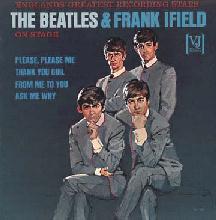Claim: The back of an early Beatles album contains a risqué mistake.
Origins: As most Beatles fans know, the Fab Four recorded for EMI, and the executives at EMI's American subsidiary, Capitol Records, were so square that they declined to issue any of the Beatles' first four singles (or

their first album) in the USA, thinking that Beatles music wouldn't sell in the American market. As a result, in 1963 the first Beatles records were released in America by
Flash forward to early 1964. Capitol Records, finally having realized that Beatles records would sell in America, is launching an expensive publicity campaign to promote the Beatles and their new single, "I Want to Hold Your Hand." They're also engaged in a lawsuit with
Vee-Jay was relatively sure they had the rights to the four Beatles songs they'd released on singles in 1963 ("Please Please Me" b/w "Ask Me Why" and "From Me to You" b/w "Thank You Girl"), but four songs do not an album make. For a solution, they turned to the only other British act on their roster: Frank Ifield, an Australian who had achieved moderate success on British pop charts. By combining eight Frank Ifield tracks with

their four Beatles songs,
The "Jolly What!" LP was, of course, a total rip-off, because it contained only four Beatles songs (all of which had already been released), because Frank Ifield was in no way one of "England's Greatest Recording Stars," and because the "On Stage" portion of the title was deceptive, as all of the tracks were studio recordings. (The only justification for the "On Stage" designation seemed to be that The Beatles and Frank Ifield had once appeared on the same bill at the Embassy Cinema in Petersborough, over a year earlier.)
Even worse, after Vee-Jay negotiated a settlement with Capitol Records that allowed them to use the masters to the Beatles' first album until October 1964, Vee-Jay re-released the same
Worse frauds have been perpetrated on the record-buying public, before and since. (Even the Rolling Stones once released studio tracks overdubbed with crowd noises to create phony "live" recordings.) What makes this one notable is the concluding sentence of the liner notes on the back of both versions of the album:
Yes, that says just what it looks like: "It is with a good deal of pride and pleasure that this copulation has been presented." And this was no printer's mistake, as the original telegram by which the copy text was transmitted to the printer clearly contained the word "copulation." Whether the author of the liner notes mistakenly (rather than mischievously) used the word "copulation" instead of "compilation" is unknown, but it provided an apt description of a record that screwed consumers out of their money.
Last updated: 22 May 2007
 Sources:
Sources:
